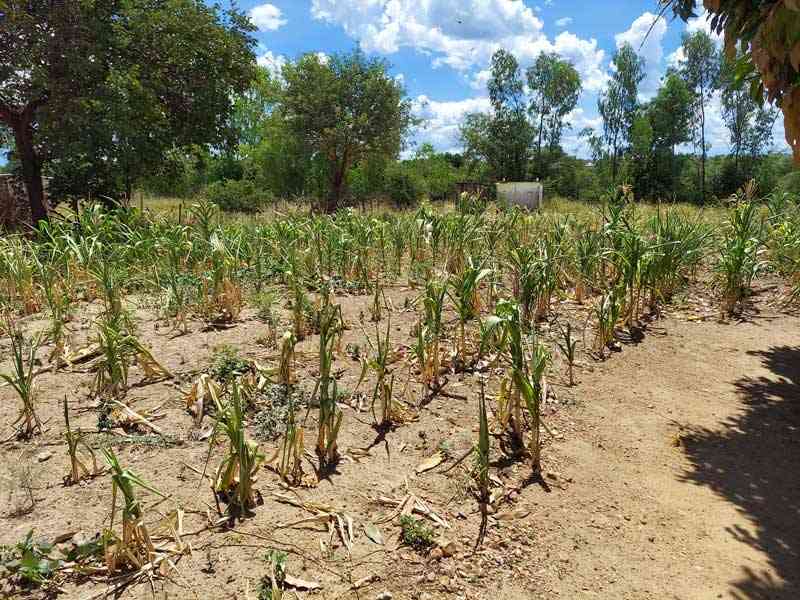
EVER since the emergence of the El-Nino-induced drought, we have been living on borrowed time and hope. The events unfolding on the ground may point towards the El Nino scenario repeating itself. This contribution is not designed to scare anyone, to be pessimistic nor to say what everyone wants to hear. What if the current drought repeats itself for another year?
Chances are there, if the world continues to warm then the southern oscillation effect will continue to deliver unfavourable results. If the below-normal rainfall patterns persist for the foreseeable future, then what will we do? While education and preparedness are key, in the southern Africa region starvation has loomed and unfolded to a greater extent, ready to deliver a brutal and shattering humanitarian crisis. No more riding on a high horse and living on borrowed bravery or talking tough because no one can be deceived anymore, therefore, no more knight in shining amour. If the current drought persists for another year, what will we do?
It is significant in this regard, to know that the same El Nino-induced scenario can persist, meaning that we can prepare for it, as forewarning one another is crucial and it saves lives as well as being a resilience building tool. The devastating impact that the current drought has on the available water resources is unbearable and spiralling out of control. The results are everywhere in the public domain, starvation is already in overdrive, livestock and wildlife are competing for scarce water resources leading to huge casualties.
As projected by the government of Zimbabwe, about two million people are starring starvation and they need emergency food aid but the number could be much higher. That is why alarm bells have been sounded to the world and the United Nations that the country and the southern Africa region require food aid like yesterday.
Positive thinking that, the current situation can be with us once again, is what proactive communities need to invest in. The country is not in short supply of water bodies in some regions and these can be used for people-centred water management plans and situate rural communities at the centre of irrigation and mechanisation.
Furthermore, the southern Africa region is not a place where mega tonnes of fossil fuels are burnt resulting in increased warming of the globe. These happen in rich and polluting nations which also clandestinely want to buy their polluting sins out by investing in greenwashing and other forms of double-dealing. Reducing fossil fuel burning is the only way the emergence of future droughts can be reduced.
This also means that major donors like World Food Programme are now focusing their attention on southern Africa to save lives with emergency food aid. It is also everyone’s hope that this food aid would reach targeted beneficiaries and no politics will take centre stage while people are starving.
History has it that, in the African contexts, food aid is often used as a political tool to cow and coerce hungry communities. This will have dire consequences, disrupting livelihoods and access to food. The time mealie-meal will disappear from shops will sound like the death knell for the national foodbasket and strategic grain reserves.
- COP26 a washout? Don’t lose hope – here’s why
- Under fire Mnangagwa resorts to Mugabe tactics
- How will energy crunch transition impact transition to renewables?
- COP26 a washout? Don’t lose hope – here’s why
Keep Reading
Urban residents are also not spared by the food aid predicament as they are equally starving and reeling from a high cost of living. They also need food aid, as they are already incapacitated by energy poverty and water rationing. As communities are receiving food aid, it is important for them to think about what they will do if the drought persists. It is also important to note how the government will be investing in the livelihoods of its people. Possibly, speeding up its water infrastructural programmes to avoid massive water scarcities in dry regions some of which never experienced any precipitations this year.
African communities should seriously revisit the issue of food sovereignty which they have surrendered to the developed countries. Their food systems are visualised through the lenses of developed countries while they view their food sovereignty as the “other.” Food sovereignty also leads to food security. Food sovereignty is regarded as the right of people to healthy and culturally appropriate food produced through ecologically sound and sustainable methods including their right to define their own food and agricultural systems.
Lack of food sovereignty and security will lead to the proliferation of genetically modified foods which are scientifically and environmentally unfriendly. In terms of food security, genetically modified foods can reduce food gaps but compromise human health.







